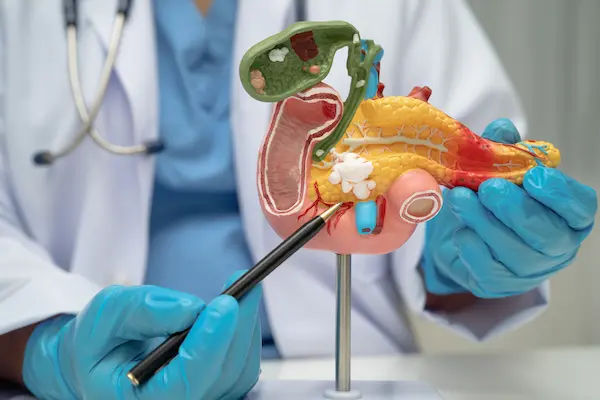Guide to Digestive Disorders Caused By Acute Pancreatitis
Learn about digestive disorders caused by acute pancreatitis, including symptoms, complications, and strategies for effective management and care.

Written by Dr. Mohammed Kamran
Reviewed by Dr. D Bhanu Prakash MBBS, AFIH, Advanced certificate in critical care medicine, Fellowship in critical care medicine
Last updated on 13th Jan, 2026

Introduction
Acute pancreatitis is a sudden and serious inflammation of the pancreas that sends thousands to the hospital each year. While the intense abdominal pain is often the focus of immediate treatment, the aftermath can leave your digestive system in turmoil. Many people are unprepared for the lingering digestive disorders that can follow an attack, such as persistent diarrhea, unexplained weight loss, and painful bloating. Understanding these complications is the first step toward effective management and a smoother recovery.
This guide will walk you through exactly why acute pancreatitis causes these digestive issues, from the disruption of enzyme production to slower stomach emptying. We will cover the most common disorders like Exocrine Pancreatic Insufficiency (EPI), explain the diagnostic process, and provide a practical roadmap for dietary changes, treatments like Pancreatic Enzyme Replacement Therapy (PERT), and lifestyle adjustments. Our goal is to empower you with the knowledge to work effectively with your healthcare team to restore your digestive health. If your symptoms persist beyond the initial recovery phase, consulting a doctor online with Apollo24|7 can provide timely guidance.
What is Acute Pancreatitis and How Does It Disrupt Digestion?
Acute pancreatitis is a sudden inflammation of the pancreas that can severely affect your digestive system and overall health.
The Pancreas's Dual Role: Digestive Enzymes and Blood Sugar
To understand the digestive fallout, you must first appreciate what a healthy pancreas does. This organ, tucked behind your stomach, is a true overachiever. It has two main jobs:
1. Endocrine Function: It produces hormones like insulin and glucagon, which regulate your blood sugar.
2. Exocrine Function: It produces powerful digestive enzymes (like amylase, lipase, and protease) that are released into your small intestine. These enzymes are essential for breaking down fats, proteins, and carbohydrates from your food into tiny particles that can be absorbed into your bloodstream.
The Inflammatory Cascade: From Protection to Self-Attack
In acute pancreatitis, the digestive enzymes become activated prematurely, while they are still inside the pancreas. Instead of breaking down food, they begin to break down the pancreas itself. This leads to intense inflammation, swelling, and pain. Think of it as a factory that accidentally sets its own machinery on fire. The body's immune response amplifies this inflammation, causing the classic symptoms of severe upper abdominal pain that radiates to the back, nausea, and vomiting.
This inflammatory process directly injures the delicate cells that produce digestive enzymes. Even after the initial inflammation subsides, these cells may be slow to recover or permanently damaged, setting the stage for post-pancreatitis digestive disorders.
Consult a Gastroenterologist for the best advice
Common Digestive Disorders Following an Acute Pancreatitis Attack
After an acute pancreatitis attack, your digestive system can face several complications that impact nutrient absorption and overall gut health.
Exocrine Pancreatic Insufficiency (EPI): The Root of Many Problems
Exocrine Pancreatic Insufficiency (EPI) is the most significant digestive disorder to arise after acute pancreatitis. It occurs when the pancreas does not produce enough digestive enzymes. Without these enzymes, your body cannot properly digest food, leading to malabsorption, a failure to absorb nutrients.
Symptoms of EPI: Steatorrhoea, Weight Loss, and Nutrient Deficiencies
The signs of EPI are direct results of malabsorption:
• Steatorrhoea: This is the medical term for fatty, foul-smelling stools that are difficult to flush. It happens because undigested fat passes through your system. This is a hallmark symptom of fat malabsorption.
• Unexplained Weight Loss: Even if you eat normally, your body isn't absorbing calories and nutrients, leading to weight loss.
• Bloating and Gas: Undigested food ferments in the colon, producing excess gas.
• Nutrient Deficiencies: Deficiencies in fat-soluble vitamins (A, D, E, K) can cause night blindness, osteoporosis, and easy bruising. General fatigue is also common due to poor calorie absorption.
Gastroparesis: When Your Stomach Slows Down
The inflammation from pancreatitis can affect the vagus nerve, which controls the movement of food from your stomach into the small intestine. When this nerve is impaired, it can lead to gastroparesis, a condition where the stomach empties too slowly. This causes early satiety (feeling full after a few bites), nausea, vomiting of undigested food, and abdominal pain.
Bile Flow Disruption and Its Consequences
The pancreas and gallbladder share a common opening into the small intestine. Swelling from pancreatitis can block this duct, impairing the flow of bile from the gallbladder. Bile is crucial for emulsifying fats. A disruption can contribute to fat digestion problems, worsening steatorrhoea and abdominal discomfort, and sometimes leading to jaundice (yellowing of the skin and eyes).
Diagnosing Pancreatitis-Related Digestive Issues
Identifying digestive problems caused by pancreatitis early is crucial for effective treatment and preventing further complications.
When to See a Doctor: Key Warning Signs
If you have recovered from an episode of acute pancreatitis but continue to experience chronic diarrhea, significant weight loss, persistent bloating, or fatigue, it is crucial to seek medical advice. These are not normal parts of recovery and indicate an underlying issue like EPI that needs management.
Common Diagnostic Tests
Your doctor will likely use one or more of the following tests:
• Faecal Elastase Test: This is a simple stool test that measures levels of elastase, an enzyme produced by the pancreas. Low levels are indicative of EPI. Apollo24|7 offers convenient home collection for tests like this, making the diagnostic process easier.
• Faecal Fat Test: A direct measurement of fat in your stool over a 72-hour period, confirming fat malabsorption.
• Blood Tests: To check for nutrient deficiencies (like Vitamin D or B12) and to monitor pancreas function.
• Imaging: A CT scan or MRI can assess structural damage to the pancreas that might be causing the dysfunction.
Get Your Health Assessed
Managing Your Digestive Health Post-Pancreatitis
After recovering from pancreatitis, maintaining digestive health is key to preventing complications and supporting overall well-being.
Dietary Modifications for Pancreatic Recovery
Diet is your most powerful tool for managing digestive disorders after pancreatitis.
The Low-Fat, High-Protein, Small-Meals Approach
• Low-Fat: Reducing fat intake is key to minimising steatorrhoea and giving your pancreas a rest. Choose lean proteins (skinless chicken, fish, tofu) and cooked vegetables.
• High-Protein: Protein is essential for tissue repair. Incorporate easy-to-digest proteins.
• Small, Frequent Meals: Instead of three large meals, eat 5-6 smaller meals throughout the day. This reduces the demand on your digestive system at any one time.
Key Nutrients to Focus On and Avoid
• Focus On: Hydration (water, broth), complex carbohydrates (oatmeal, whole-grain bread), and fat-soluble vitamins (through supplements if recommended by your doctor).
• Avoid: Alcohol completely, fried foods, high-sugar foods, and red meat, which can be harder to digest.
Pancreatic Enzyme Replacement Therapy (PERT)
PERT is the cornerstone of treatment for EPI. These prescription capsules contain the digestive enzymes your pancreas is not producing enough of. You take them with every meal and snack. They work by breaking down food in the intestine, allowing for proper absorption. Getting the dosage right is critical and should be done under a doctor's supervision.
Lifestyle Changes to Support Healing
• Smoking Cessation: Smoking significantly increases the risk of recurrent pancreatitis and progression to chronic pancreatitis.
• Alcohol Abstinence: Alcohol is a major cause of pancreatitis and can trigger new attacks.
• Stress Management: Chronic stress can exacerbate digestive symptoms. Techniques like meditation, light walking, or yoga can be beneficial.
Conclusion
Recovering from acute pancreatitis involves more than just waiting for the pain to subside. The digestive disorders that can follow require attentive care and a proactive approach. By understanding the link between pancreatic inflammation and conditions like EPI, you can better identify the symptoms and seek appropriate help. The combination of a tailored diet, potentially including PERT, and committed lifestyle changes offers a clear path to managing these challenges and regaining your quality of life. Remember, this journey is a marathon, not a sprint.
Consult a Gastroenterologist for the best advice
Consult a Gastroenterologist for the best advice

Dr. Jatin Yegurla
Gastroenterology/gi Medicine Specialist
11 Years • MD (PGI), DM (AIIMS Delhi), FAGIE (AIIMS Delhi), ESEGH (UK), Gold Medalist
Hyderabad
Apollo Hospitals Jubilee Hills, Hyderabad
(675+ Patients)

Dr. Amit Pandita
Gastroenterology/gi Medicine Specialist
10 Years • MBBS. MD (INTERNAL MEDICINE) DrNB (GASTROENTEROLOGY AND HEPATOLOGY)
Delhi
Apollo Hospitals Indraprastha, Delhi

Dr Piyush Vishwakarma
Gastroenterology/gi Medicine Specialist
11 Years • MBBS, MD, DrNB,
Delhi
Apollo Hospitals Indraprastha, Delhi

Dr. Yogesh Batra
Gastroenterology/gi Medicine Specialist
20 Years • MBBS, MD, DM
Delhi
Apollo Hospitals Indraprastha, Delhi
(150+ Patients)

Dr Abhishek Tiwari
Minimal Access/Surgical Gastroenterology
15 Years • MBBS, MS, Diabetic Foot Course (Pisa, Italy)
Delhi
Apollo Hospitals Indraprastha, Delhi
Consult a Gastroenterologist for the best advice

Dr. Jatin Yegurla
Gastroenterology/gi Medicine Specialist
11 Years • MD (PGI), DM (AIIMS Delhi), FAGIE (AIIMS Delhi), ESEGH (UK), Gold Medalist
Hyderabad
Apollo Hospitals Jubilee Hills, Hyderabad
(675+ Patients)

Dr. Amit Pandita
Gastroenterology/gi Medicine Specialist
10 Years • MBBS. MD (INTERNAL MEDICINE) DrNB (GASTROENTEROLOGY AND HEPATOLOGY)
Delhi
Apollo Hospitals Indraprastha, Delhi

Dr Piyush Vishwakarma
Gastroenterology/gi Medicine Specialist
11 Years • MBBS, MD, DrNB,
Delhi
Apollo Hospitals Indraprastha, Delhi

Dr. Yogesh Batra
Gastroenterology/gi Medicine Specialist
20 Years • MBBS, MD, DM
Delhi
Apollo Hospitals Indraprastha, Delhi
(150+ Patients)

Dr Abhishek Tiwari
Minimal Access/Surgical Gastroenterology
15 Years • MBBS, MS, Diabetic Foot Course (Pisa, Italy)
Delhi
Apollo Hospitals Indraprastha, Delhi
More articles from Acute Pancreatitis
Frequently Asked Questions
1. How long after acute pancreatitis can digestive problems like EPI last?
The duration varies. For some, it's a temporary issue lasting weeks or months as the pancreas heals. For others, especially if the attack was severe, EPI can be a long-term condition requiring ongoing management with enzyme replacement therapy.
2. Can you fully recover from Exocrine Pancreatic Insufficiency after pancreatitis?
Yes, in many cases, if the damage to the pancreas is not permanent, function can recover over time. However, for some individuals, EPI may be chronic. The key is proper medical supervision to monitor pancreatic function through follow-up tests.
3. What does steatorrhoea look like?
Steatorrhoea typically presents as stools that are loose, bulky, pale, and unusually foul-smelling. They may appear oily or greasy and tend to float or stick to the side of the toilet bowl, making them difficult to flush.
4. Is the diet for pancreatitis recovery the same as for EPI?
Yes, they are closely aligned. Both conditions require a low-fat diet to reduce the workload on the pancreas and minimise symptoms like diarrhea. The main difference is that for EPI, this diet is combined with pancreatic enzyme supplements (PERT) to ensure proper nutrient absorption.
5. Can acute pancreatitis lead to diabetes?
Yes, it can. Since the pancreas also produces insulin, significant damage from a severe attack can impair its endocrine function, leading to a form of diabetes known as pancreatogenic diabetes (Type 3c). This requires careful blood sugar management.



